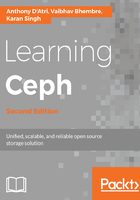
Introducing Ceph Storage
Ceph is an open source project that provides a solution for software-defined, network-available storage with high performance and no single point of failure. It is designed to be highly scalable to the exabyte level and beyond while running on general-purpose commodity hardware.
In this chapter, we will cover the following topics:
- The history and evolution of Ceph
- What's new since the first edition of Learning Ceph
- The future of storage
- Ceph compared with other storage solutions
Ceph garners much of the buzz in the storage industry due to its open, scalable, and distributed nature. Today public, private, and hybrid cloud models are dominant strategies for scalable and scale-out infrastructure. Ceph's design and features including multi-tenancy are a natural fit for cloud Infrastructure as a Service (IaaS) and Platform as a Service (PaaS) deployments: at least 60% of OpenStack deployments leverage Ceph.
Ceph is architected deliberately to deliver enterprise-quality services on a variety of commodity hardware. Ceph's architectural philosophy includes the following:
- Every component must be scalable
- No individual process, server, or other component can be a single point of failure
- The solution must be software-based, open source, and adaptable
- Ceph software should run on readily available commodity hardware without vendor lock-in
- Everything must be self-manageable wherever possible
Ceph provides great performance, limitless scalability, power, and flexibility to enterprises, helping them move on from expensive proprietary storage silos. The Ceph universal storage system provides block, file, and object storage from a single, unified back-end, enabling customers to access storage as their needs evolve and grow.
The foundation of Ceph is objects, building blocks from which complex services are assembled. Any flavor of data, be it a block, object, or file, is represented by objects within the Ceph backend. Object storage is the flexible solution for unstructured data storage needs today and in the future. An object-based storage system offers advantages over traditional file-based storage solutions that include platform and hardware independence. Ceph manages data carefully, replicating across storage devices, servers, data center racks, and even data centers to ensure reliability, availability, and durability. Within Ceph objects are not tied to a physical path, making objects flexible and location-independent. This enables Ceph to scale linearly from the petabyte level to an exabyte level.